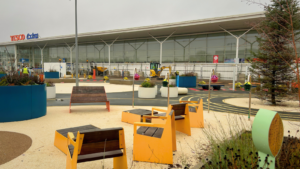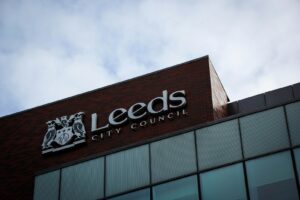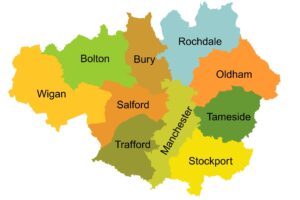Focusing on ‘what’s strong, not what’s wrong’, asset based community development is helping local areas shake off their ‘deprived’ status and build themselves from the bottom up.
The Miners Community Arts Centre has been proving the power of asset based community development before the term was even heard of in the area.
A former miners bathhouse in Moston, north Manchester, – the site of the former pit is opposite – it had been a working men’s club until it was left to fall into disrepair.
Back in 2010 local man Lou Beckett – welder, artist and now community arts entrepreneur – was looking for somewhere to paint his pictures and asked the landlord if he could repair and manage the building in return for using it as a studio.
He and a team of locals set about transforming the building into a community space; five years on the Miners Community Arts Centre houses the small cinema, artists studios and gallery, a bar and venue for local bands and events.
Those hiring it out range from local kids practicing their dancing to African gospel singers on a Sunday and a European punk festival once a year. ‘The punks are very polite and hoover up after themselves’, says Lou.
Apart from a few pockets of funding the centre has had no outside input; rather it has mined the assets and talents of the local community and begged and borrowed what it needs. If you look closely you’ll see that some of the chairs were originally in a branch of Costa Coffee, and a planned recording studio is soundproofed with the former insides of industrial freezers. Local people offer their time as electricians, sound crew, builders and café attendants. It’s a community asset run by and for the people.
Down the road, FC United, a community owned and run football club, will soon open its first stadium. The Miners is looking forward to the extra revenue once football matches begin, as well as the benefits of having another community collective on its doorstep.
In a so-called ‘deprived’ area this local community is proving it has more than enough assets to generate hope – and income streams – and is rebuilding its local economy from the bottom up.
Community-building co-ordinator Helen Smith of Forever Manchester mapping assets in Oldham Challenging the ‘fund it, fix it, model
In Moston ‘community building’ has happened organically but a technique called asset based community development – ABCD – is being used here and elsewhere in the region to give such development work a helping hand.
Forever Manchester – the city’s community foundation – has given small grants to the Miners Community Arts Centre and is about to start an ABCD programme in Moston and nearby Harpurhey.
An American import, ABCD is a back to basics approach that uses the assets of a place – its people, its institutions, its infrastructure and heritage – as the building blocks for community development. So-called ‘community builders’ are trained to map the assets of the people and the area and connect local people together through a series of conversations and collaborations. The focus is on unearthing the resources already available in the community; only small amounts of funding are given through a grants programme called Cash for Graft.
To chief executive of Forever Manchester Nick Massey ABCD marks a sharp change in approach from the old regeneration model, which often saw large amounts of funds pour into an area through intermediaries to little effect.
‘We’ve had two decades of infrastructure and capital investment going into poor areas of Manchester without asking the people there what they wanted,’ he says. ‘These area were pre-labelled as “difficult” and “deprived”.’
‘ABCD has helped us transform into a
community foundation for the 21st century’
ABCD in contrast starts with the people living there and focuses on what the community has rather than what it doesn’t. ‘It’s basic honest work’, says Nick. ‘We are catalysts. We connect people and get them to recognise their own talents.’
Manchester was one of the first places in the UK to start using ABCD and Massey outlined the technique in a New Start article in 2013, describing it as a challenge to the ‘fund it, fix it’ model.
Forever Manchester began using the model in 2012 after austerity and the recession of 2008 made the traditional foundation model no longer viable. The foundation changed its name to Forever Manchester and moved its emphasis from grant giving to community building, helping local areas shape their own destiny rather than chase dwindling funds.
‘We did some good grantmaking but we were being led by the nose and had to work with defined sets of people and programmes’, Massey says. ‘We played it safe as many foundations do.’
He says that ABCD has helped Forever Manchester transform itself into a ‘community foundation for the 21st century’.
It now gives out less money but funds a greater number of organiations and the results so far are encouraging. Its first experiments in Oldham and Trafford led to dramatic increases in community activity with fifty community-led projects emerging in the first 18 months. One of the first residents to be engaged Lyndsey Ashworth is now a community builder herself at Forever Manchester and, in this New Start article, described how her life had been transformed by the programme. An evaluation report by CLES in 2014 found that every £1 spent by the foundation converts to over £5 in value and potential.
Some that argue that ABCD is too positive a programme, taking the emphasis on assets too far while not taking needs and entrenched inequalities seriously enough. As neighbourhood and communities blogger Kevin Harris says it risks being the ‘application of gloss’.
But community building co-ordinator at Forever Manchester Helen Smith says that focusing on assets does not mean they are naïve to need.
‘It’s the glass half full approach’, she says. ‘You can’t do something with air but you can do something with water. We know what the needs are in a place but we don’t want to start there.’
Back in Moston, community builders Helen and Lisa are on the high street having conversations with local traders and residents. They find a local man growing food on some waste ground to supply a local takeaway and discover a local traders group.
Their work is old-fashioned talking and knocking on doors, building up to a community plan, which it will create with the community for the next three years.
As funding for regeneration becomes ever constricted, ABCD goes beyond the money model to unearth more powerful resources within communities, and in doing so levels the balance of power.
As Massey says: ‘The nurturing of communities is our cause and something to be passionate about. There’s no “us and them”. Just us.’

















Leave a Reply